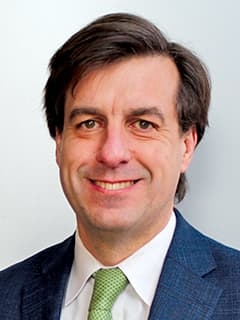
Pedro Gonzalez-Alegre, MD, PhD
About Pedro Gonzalez-Alegre, MD, PhD
Dr. Gonzalez-Alegre is a clinician-scientist devoted to the investigation and clinical care of inherited neurological disorders, particularly those that affect movement. His laboratory focuses on gaining a better understanding of the neurobiological bases of the movement disorder dystonia, aiming to develop novel therapeutic approaches.
Dr. Gonzalez-Alegre’s lab has made important contributions to the understanding of the most common form on early onset inherited dystonia, known as DYT1. Those include addressing the role of the mutated protein, torsinA, in the endoplasmic reticulum and nuclear envelope, using cellular and molecular approaches in cell-based and animal models of the disease. He has also pioneered the development of gene silencing strategies as a potential therapeutic approach for DYT1. More recently, the focus of Dr. Gonzalez-Alegre’s research has expanded to other genetic forms of dystonia, such as DYT6 or X-linked dystonia parkinsonism, among others. The goal of these new studies is to identify common pathogenic mechanisms shared by different genetic forms to converge on a single therapeutic approach for all.
As director for Clinical Programs at the Raymond G. Perelman Center for Cellular and Molecular Therapy at Children’s Hospital of Philadelphia, Dr. Gonzalez-Alegre participates in the design of preclinical, investigational new drug-enabling and early phase human trials for inherited brain diseases, interacting with many other members of the team that span from basic scientist to experts of regulatory affairs. In addition, he directs a Huntington’s Disease (HD) Center of Excellence at the University of Pennsylvania, where he conducts research in HD patients involving neuroimaging, the use of biosensors for objective phenotyping or clinical trials, among others.
Titles
Principal Investigator
Awards and Honors
S. Weir Mitchell Award, American Academy of Neurology, 2003
Junior Award for Excellence in Basic Science Research, Movement Disorders Society, 2004
Medical Education Faculty Award, University of Iowa College of Medicine, 2009, 2012
Stanley Fahn Award, Dystonia Medical Research Foundation, 2012
Jon Stolk Award in Movement Disorders for Young Investigators, American Academy of Neurology, 2012
Resident Educator of the Year Award, Department of Neurology, the University of Iowa, 2014
Leadership and Memberships
American Academy of Neurology, 1999-present
Movement Disorders Society, 2000-present
American Neurological Association, 2010-present
Education & training
Medical Degree
MD, University of Malaga Medical School, Málaga, Spain.
PhD, University of Malaga Medical School (Neuroscience), Málaga, Spain.
Publications
Publications
Beauvais G, Rodriguez-Losada N, Ying L, Zakirova Z, Watson JL, Readhead B, Gadue P, French DL, Ehrlich ME, Gonzalez-Alegre P. Exploring the Interaction Between eIF2α Dysregulation, Acute Endoplasmic Reticulum Stress and DYT1 Dystonia in the Mammalian Brain. Neuroscience. 2018 Feb; 371:455-468. PMID: 29289717
Zakirova Z, Fanutza T, Bonet J, Readhead B, Zhang W, Yi Z, Beauvais G, Zwaka TP, Ozelius LJ, Blitzer RD, Gonzalez-Alegre P and Ehrlich ME. Mutations in THAP1/DYT6 reveal that diverse dystonia genes disrupt similar neuronal pathways and functions. PLoS Genetics. 2018 Jan; 14(1):e1007169. PMID: 29364887
Beauvais G, Bode N, Watson J, Wen H, Kawano H, Glenn KA, Harata NC, Ehrlich ME, and Gonzalez-Alegre P. Disruption of protein processing in the endoplasmic reticulum of DYT1 knock in mice implicates novel pathways in dystonia pathogenesis. J Neurosci. 2016 Oct; 36(40):10245-10256. PMID: 27707963
Gonzalez-Alegre P, Bode N, Davidson BL, Paulson HP. Silencing primary dystonia: lentiviral-mediated RNA interference therapy for DYT1 dystonia. J Neurosci. 2005 Nov; 25: 10502-10509. PMID: 16280588
Gonzalez-Alegre P, Paulson HP. Aberrant cellular behavior of mutant TorsinA implicates nuclear envelope dysfunction in DYT1 dystonia. J Neurosci. 2004 Mar; 24(11):2593-2601. PMID: 15028751